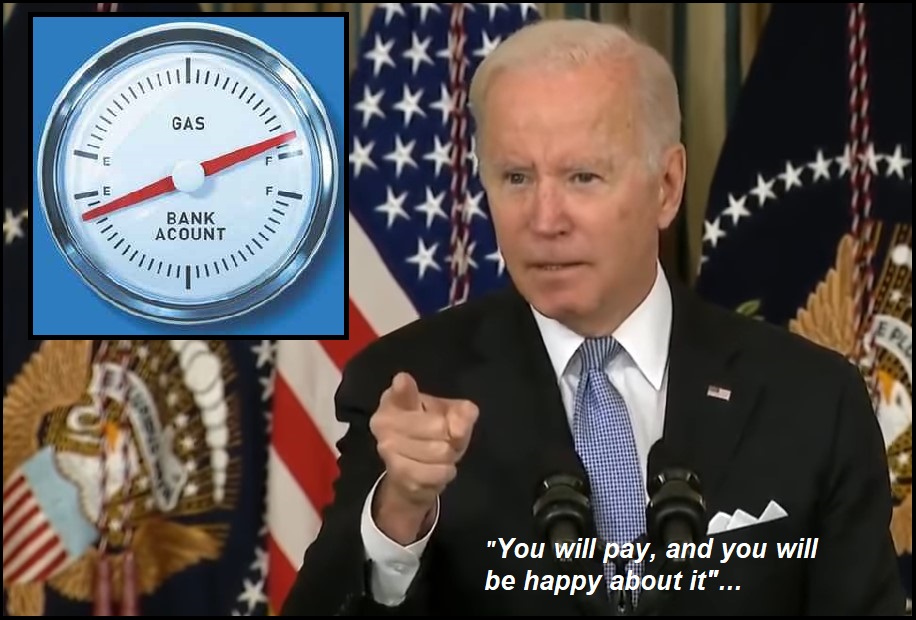Posted originally on the conservative tree house on June 6, 2022 | Sundance
Last Friday the Biden administration raised the mandatory amount of biofuel, specifically ethanol, that must be blended within the U.S. gasoline supply. The previous amount of 10% (summer blend) was raised to a year-round 15% (waiver) by the Environmental Protection Agency (EPA). This is likely to lead to two sets of bigger issues, less food and higher gas prices.
♦ First issue. – The Renewable Fuel Standard (RFS) is a government mandate, passed in 2005 and expanded in 2007, that requires growing volumes of biofuels to be blended into U.S. transportation fuels like gasoline and diesel every year. Approximately 40 percent of corn grown in the U.S. is used for ethanol. Raising the amount of ethanol required in gasoline will result in the need for more biofuel (corn). With farming costs and outputs already under pressure this could be problematic.

♦ Second issue – The EPA enforces the biofuel standard by requiring refineries to submit purchase credits (known as Renewable Identification Numbers, or RINs) to the Environmental Protection Agency (EPA) proving the purchases. This enforcement requirement sets up a system where the RIN credits are bought and sold by small refineries who do not have the infrastructure to do the blending process. They purchase second-hand RIN credits from parties that blended or imported biofuels directly. This sets up a secondary income stream, a trading market for the larger oil companies, refineries and importers.
The RIN credit trading platform is similar to what we might expect to see if the ‘Carbon Trading’ scheme was ever put into place. However, now that summer biofuel requirements for blended gasoline have gone from 10% to 15%, the price of the RIN credits will likely jump. This will cost refineries billions in additional expenses,…. which will mean the cost of the gasoline from the refineries will increase,….. which will mean the cost of the gasoline at the pump will go higher.
The EPA theory is that RIN credits should be expensive thereby forcing all oil refineries to invest in infrastructure that makes the blended fuel. All of the infrastructure from the refinery to the gas station would need to be modified to facilitate the new 15% RFS standard. Again, higher prices at the pumps as a result of oil companies and refineries needing to spend billions on upgrades. Which brings us to issue number three.
♦ Third Issue – “Ethanol is a valuable source of octane in finished gasoline, but it is chemically different than petroleum gasoline and cannot be used in concentrations above 10 percent in small engines — like outboard boat motors, motorcycles, lawnmowers, generators or chain saws — or in any cars made before 2001. Complicating matters further, most cars on the road today still aren’t warrantied to run on gasoline with more than 10 percent ethanol. Retail stations also must have compatible infrastructure in order to sell gasoline with higher ethanol blends.” This issue is known within the industry as “The Blend Wall.”
The net result of Joe Biden’s EPA raising the mandatory amount of biofuel that must be present in the U.S. gas supply is this:
(1) Less food as more corn is needed for ethanol.
(2) Higher prices for finished and blended gasoline.
(3) Vehicle engines breaking down at a much higher rate.
The predictable Biden outcome is the absolute worst scenario for the middle-class.
ABC Article on the EPA change HERE.
AFPM Background Information HERE.
WASHINGTON – “The American Fuel & Petrochemical Manufacturers group, which represents refineries, called the 2022 figure “bewildering and contrary to the administration’s claims to be doing everything in their power to provide relief to consumers.” The group said unachievable mandates will increase fuel production costs and keep consumer prices high.” (more)


